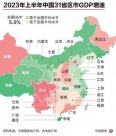(Beijing Comprehensive News) Chinese official data shows that in July, the China Manufacturing Purchasing Manager Index (PMI) increased by 0.3 percentage points from last month, but it is still lower than the Rongku line, and it is at shrinking for four consecutive months.
Comprehensive Reuters, Wall Street Journal, and First Financial report, the China National Bureau of Statistics released data on Monday (July 31), showing that the PMI of China's manufacturing industry in July was 49.3, an increase of 0.3 percentage points from June, which was also higher.49.0 predicted by economists investigated at the Wall Street Journal.
However, in July, the manufacturing PMI was still lower than the Rongku Line, and it was atrophic for four consecutive months.From 49.2, 48.8, 49, the official PMIs were 49.2, 48.8, and 49, respectively.
PMI usually uses 50 as a strong and weak boundary.More than 50 is considered to be expanded by the economy; below 50, it is considered that the economy is shrinking.The last time the PMI of Chinese manufacturing has contracted for more than three consecutive months, from May to October 2019.
Zhao Qinghe, a senior statistician of the Service Industry Investigation Center of the China National Bureau of Statistics, said that in July, the manufacturing PMI picked up slightly for two consecutive months.The overall improvement of manufacturing prosperity has continued to improve.
He also said that some companies in the survey reported that the current external environment is complicated and severe, overseas orders are reduced, and insufficient demand is still the main difficulties facing enterprises.
China Non -manufacturing PMI (including service activities and construction industry sub -indexes) in July in China dropped from 53.2 in June to 51.5.Among them, the construction industry is the weakest since February.
Reuters quoted the economist's think tank (EIU) economic analyst Xu Tianchen: "The decline in construction activities has fallen sharply, indicating that the Chinese real estate industry shows signs of potential" death spiral ", which is worrying.


